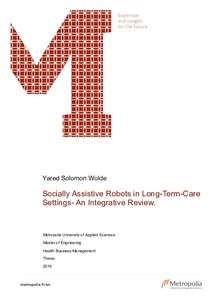Socially Assistive Robots in Long-Term-Care Settings : An Integrative Review
Wolde, Yared Solomon (2019)
Wolde, Yared Solomon
2019
All rights reserved. This publication is copyrighted. You may download, display and print it for Your own personal use. Commercial use is prohibited.
Julkaisun pysyvä osoite on
https://urn.fi/URN:NBN:fi:amk-2019121125866
https://urn.fi/URN:NBN:fi:amk-2019121125866
Tiivistelmä
The use of robots is common in most industries including the health care industry, robots has been developed to assist or work alone from lifting objects to assisting in surgery. The purpose of this master’s thesis was to explore the use of SARs and their emergence into LTC sector. This study aimed to find out the functional categorization of SARs, and possible challenges of using SARs in an LTC setting.
This descriptive literature review used EBSCOhost and PubMed search engines and manual searches to collect data. Scientific articles published after 2008 were selected in this study and integrative review method was used to process and analyze the data. A total of 131 scientific articles were found on a topic level and went through the selection criteria. In the end, nine articles were selected for final analysis. This study selected articles which discussed SARs from a long-term care perspective.
The result showed that SARs were categorized based on the kind of support they aimed to provide; physical support, non-physical support, and unspecified support. Most SARs on the market fall into those functional categories. The study also showed many users have a positive attitude towards SARs however there was low acceptance of physical contact. Besides, SARs evaluated in the studies were viewed as safe and useful but some which give cognitive support were found to show no significant effect on the users.
This may indicate that the use of socially assistive robots in long-term care is yet under progress and SARs which provide non-physical support are more widely noticed in the LTC sector.
This descriptive literature review used EBSCOhost and PubMed search engines and manual searches to collect data. Scientific articles published after 2008 were selected in this study and integrative review method was used to process and analyze the data. A total of 131 scientific articles were found on a topic level and went through the selection criteria. In the end, nine articles were selected for final analysis. This study selected articles which discussed SARs from a long-term care perspective.
The result showed that SARs were categorized based on the kind of support they aimed to provide; physical support, non-physical support, and unspecified support. Most SARs on the market fall into those functional categories. The study also showed many users have a positive attitude towards SARs however there was low acceptance of physical contact. Besides, SARs evaluated in the studies were viewed as safe and useful but some which give cognitive support were found to show no significant effect on the users.
This may indicate that the use of socially assistive robots in long-term care is yet under progress and SARs which provide non-physical support are more widely noticed in the LTC sector.
